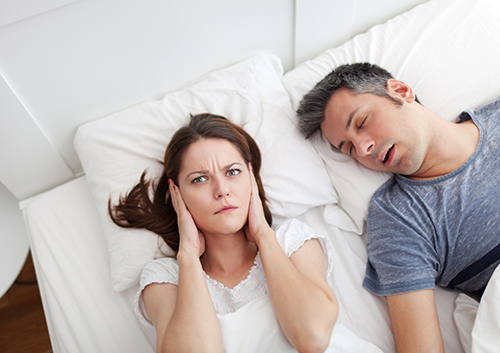Sleep Apnea: What a Dentist Can Do
August 13th, 2019

You find yourself drowsy and irritable all day. Or you have trouble sleeping, and when you do, you snore loudly throughout the night punctuated with silent pauses where you aren’t breathing at all. Or your loved ones tell you that you’ve been keeping them awake with your snoring or frightening them awake when you gasp for breath. Whatever symptom may have brought you to the doctor, you’ve been diagnosed with obstructive sleep apnea, and now it’s time to get this sleep disorder under control.
Obstructive sleep apnea occurs when the tissue in the back of the throat relaxes, partially blocking the airway, or structural problems in the mouth and throat (such as enlarged tonsils or tongue) obstruct air flow. The tissue around the air passage vibrates with every breath causing those annoying snoring sounds. More dangerous, an obstructed airway means that there is not enough oxygen getting into the lungs. The struggle to breathe wakes us, interrupting the deep sleep we need to function. Untreated, the results of sleep apnea can range from drowsiness and irritability to a greater risk of high blood pressure, heart disease, and stroke. Luckily, there are several approaches to combatting this form of sleep apnea, including life style changes, surgery or breathing machines, and orthodontic appliances.
- Lifestyle Changes
Sleep apnea is more likely to affect those who are overweight, smoke, use alcohol, take certain medications, or sleep on their backs. If you can make changes in your lifestyle that will restore the quality of your sleep, this is a great first option.
- Surgery or Breathing Machines
Sometimes obstruction of the airway is caused by structural problems in the throat or mouth. Tissue can be reshaped or removed during surgery to widen and stabilize the breathing passage. Or you might be prescribed a machine such as a CPAP (continuous positive airway pressure) machine, which blows pressurized air through a tube and mask to keep the airway open during sleep.
- Oral Appliances
Dr. Cody Henriksen can also be an important resource if you struggle with obstructive sleep apnea. Many people suffering from this disorder prefer an oral appliance for its effectiveness, comfort, and convenience. One common oral sleep appliance is designed to support your lower jaw in a forward position. This jaw movement increases the open space of your airway as you sleep. Other appliances can prevent the tongue from blocking the airway and obstructing air flow. These appliances resemble mouthguards and retainers, and, like them, are custom made just for you. We will recommend the type of appliance best suited to your needs, and will take a model of your mouth and teeth so that a lab can craft an appliance that will be a perfect fit. We will adjust it for comfort if necessary, instruct you on its use and care, and schedule follow up treatment to make sure the appliance is treating your sleep apnea as efficiently as possible.
Whether you opt for a change of lifestyle habits, a CPAP machine, surgery, or an oral appliance, it is important that you treat this sleeping disorder. Left untreated, obstructive sleep apnea can have many serious consequences. If you suspect you might have sleep apnea, talk to us during your next visit at our Sioux Falls, SD office. You deserve a good—and healthy—night’s sleep.


